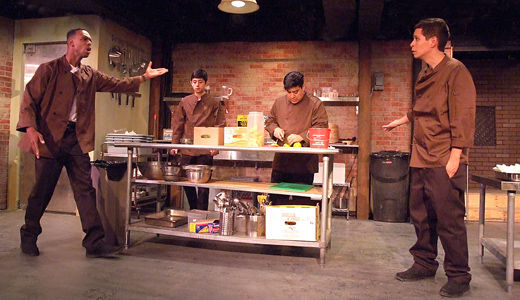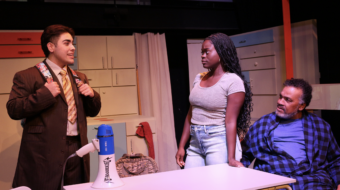
LOS ANGELES – “I worked in the restaurant industry for a long time,” says playwright Elizabeth Irwin, who has taken her experience and transformed it into a crisp, fast-paced 90 minutes of hyperreal theater in My Mañana Comes, now playing in its L.A. premiere at the Fountain Theatre.
The play first appeared off-Broadway in 2014 at the Peter Jay Sharp Theater and won three prestigious nominations for outstanding new play awards. It requires the actors’ machine-like coordinated attention every second of this 90-minute romp.
We meet four busboys (yes, there is some comment about the demeaning term) at an upscale establishment on New York’s Upper West Side. Irwin exposes the many fault lines in society that affect working people struggling to keep their heads above water. First, there’s citizenship and lack of documentation for immigrants, nationality, and race. (There are no women characters, but the men are in relationships affected by their work. The gay-straight issue does not come into play.) Lending an extra degree of irony is the fact that the French restaurant owner and his manager, unseen but referred to, are themselves both immigrants.
There are no caricatures here: Each one is fully human in all his dimensionality, and not to be summed up by a label.
And then there are also different levels of personal ambitiousness, and an individual’s willingness to tolerate or to resist abuse. Another fault line the author mines richly is that between comedy and tragedy: There’s plenty of each, and sometimes it’s hard to tell them apart.
Whalid (Peter Pasco), native born but not strongly connected to his Mexican ancestry, is a party animal with vague ambitions to improve himself, maybe as an EMT or maybe with the transit authority. He lives at home with his parents.
Peter (Lawrence Stallings), African American, is content enough doing a proficient job as a busboy, but he has family responsibilities and needs a dependable income. With a clear grasp of the work routine, he has obvious managerial potential, and indeed is being considered for a higher paying job in one of the owner’s new restaurants.
Jorge (Richard Azurdia), an undocumented worker from Mexico, is abstemiously saving every penny he earns for that mañana when he returns to build a two-story house for his wife and kids. But his dedication is costly: He lives like a humble, selfless monk outside of work, and back home his children are starting not to remember him.
Pepe (Pablo Castelblanco), from Ciudad Juárez, is also here without papers. He’s the new hire, and is just learning enough English to get by. He dreams not of going back, but of bringing his brother up to join him in the U.S. He and Jorge pay high rents for beds in their densely-inhabited apartments.
All these workers depend on their share of tip money, but have to take into account slow times in the business. They also get “shift pay,” not an hourly rate but a lump sum for each shift worked. But this is an optional and variable form of payment in restaurant work.
When life throws curve balls, as it will do, getting by can get awfully rough. When the manager announces the restaurant will no longer offer shift pay, it’s a crisis. “I got no wiggle room left,” says Peter. “It’s like I can’t breathe…. They decide that we don’t deserve no dignity.” Peter lays out a strong case for all walking out together if the shift pay is not restored, showing his clear leadership potential. But it will only work if the four workers achieve unity among them: That’s the big question.
At stake is not just their livelihood. The crisis also asks what it means to be a man? To stand up for your rights? Or stay on the job, accept the abuse, try to make do, and keep your promise to the family back home and save up for that beautiful new house?
This situation cries out for unionization and guaranteed wages. Inevitably a viewer must also ask, Do we really need the tip system to run a business? What if workers simply had a respectable living wage with benefits, as they do for the most part in Western Europe?
Can all the fault lines be bridged in the quest for unity? How will unity be won?
The acting is all top-notch, and there’s much bilingual wordplay. But aside from the four actors on stage, some other starring roles deserve mention: First, the director, Armando Molina, who has made a career of Latino theater. He keeps the rapid-fire, non-stop crackerjack dialogue tightly calibrated to his split-second timing, recreating the go-go-go hustle of a busy restaurant that diners in the front of the house never imagine. He integrates it all smoothly with swinging doors, plates of hot and cold food emerging from the kitchen, and brief balletic interludes signifying the passage of time. “So when you go to a restaurant,” says Molina, “you’ll see, consider, who’s putting the food on the table and who’s cleaning the tables and who’s making your life lovely and beautiful as you eat your fabulous dinner.”
The scenic and production design by Michael Navarro is stunning. The sheer quantity of different items – the busboys’ personal belongings, kitchenware, food, inventory, time cards, sharp knives – that the four actors are asked to juggle is simply amazing to the eye. It’s a marvel of coordination for which Dillon Nelson, responsible for props design and set dressing, also rates kudos.
Jennifer Edwards as the lighting designer rates another star review. She has combined theatrical lighting with the lamps used over kitchen worktables with seemingly effortless distinction. All the quick time changes require their own special effects as well.
Sound designer Christopher Moscatiello uses radio background, subway noises, stairs, doors, clocks, and the repeated slicing and dicing in a heavily-used kitchen to create a convincing tonal environment.
Though writ on a small scale, My Mañana Comes encapsulates the tension of an impending labor action recalling Waiting for Lefty, Clifford Odets’ 1935 play about New York City taxi drivers. That revolutionary work in the agitprop tradition broke down the fourth wall of the theater when at the end both actors and the audience were all yelling “Strike! Strike!”
My Mañana Comes is great expository working-class theater, but the conclusion is not quite so ecstatic as Odets’. There is a qualified victory for the workers, but at what terrible price!
Right now it looks like no iridescent rainbow is waiting in the wings for restaurant workers, among the most exploited in America. Irwin’s play shows you the scope of the problem, and also why that beautiful mañana is not about to dawn tomorrow.
My Mañana Comes plays at the Fountain Theatre, 5050 Fountain Ave. (at Normandie), Los Angeles 90029, through June 26, Saturdays at 3 pm and at 8 pm, Sundays at 3 pm, and Mondays at 8 pm. Every Monday night is “Pay what you can.” For tickets call (323) 663.1525 or go to www.FountainTheatre.com.
photo: Ed Krieger












Comments